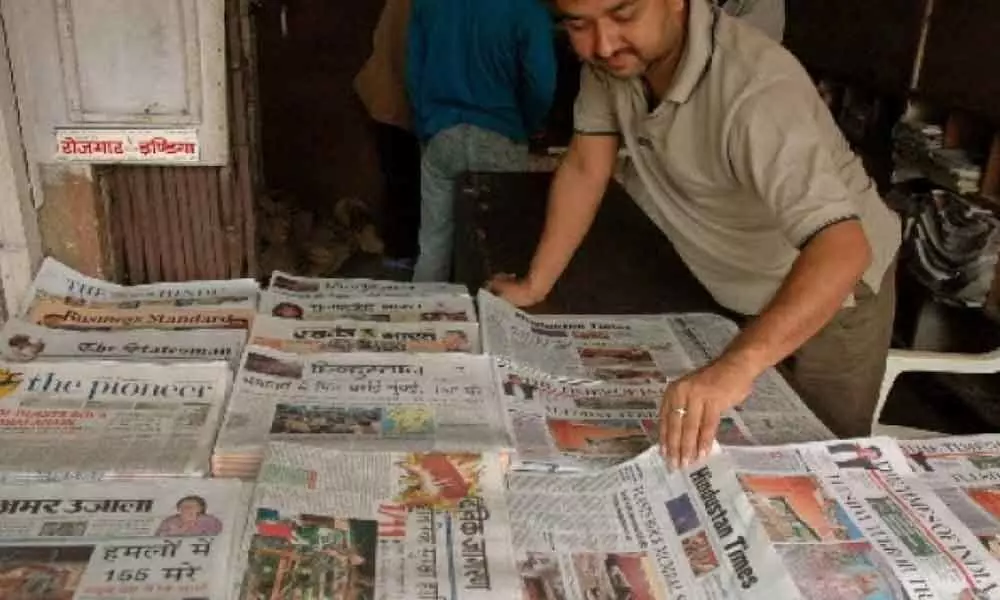When fourth estate falls from grace…

A GO issued by the Andhra Pradesh government on October 30, delegating the powers of Special Secretary, Information and Public Relations to Secretaries of respective departments to issue clarifications, lodge complaints, and if need be, to file appropriate legal cases through public prosecutor against false, baseless and defamatory news items published/telecast/posted in print/electronic/social media, has created flutter among media circles.
The present GO has reference to the earlier GO issued by the Y S Rajashekar Reddy government in February 2007 and kept in abeyance then in the wake of protests. But the same GO, in a little modified way, was resurrected by Chandra babu Naidu government when he became the first Chief Minister of the newly formed Andhra Pradesh State. And used specifically against the editor and the journalists of Sakshi.
The present GO is an attempt to put breaks on deliberate attempts by a section of the media to tarnish the image of the government by spreading false, baseless and defamatory news with malafide intentions.
The government felt the need for the GO to ensure that the true and correct information reaches the people. The Secretaries of departments were given power by the GO as they have thorough knowledge of the affairs of their respective departments.
In the recent past, one has observed that some newspapers have selected a target rather than a policy and that their primary responsibility is to destroy a pre-determined victim rather than serve the reader by presenting both points of view on controversial issues.
Their yardstick of excellence lays in persistently following one line of attack and subordinating every other consideration to this. With no let down, nor hindrance, they indulge in smear and innuendo against the present government.
They have given up the basic values of journalism to be accurate and truthful in their news stories and comments. This naturally restricts their role as free press, though this may serve the partisan interests of vain, egocentric proprietors.
As Katherine Fanning , who worked as the editor of Christian Science Monitor commented , "A free press can be responsible press, but a restricted press cannot be responsible because to restrict, it immediately infers there is not a full exploration of the facts and information that the public needs to make an informed decision.
She also said a newspaper is neither an adversary nor an ally of the powers that be.
She further said that in journalism what is important is the paper's motivation - whether it wants to inform or seeks to manipulate its readers for a political purpose or to boost circulation.
A M Rosanthal, who was editor of New York Times, was of the view that even after the first amendment to the Constitution of America, it does not ensure absolute freedom. He says that as a cub reporter, he had learnt his first lesson about the First Amendment.
"The Amendment ensures that I have the right to ask anybody any question I wish. And anybody has the right to tell me to shove it in my ear," he said.
The most serious question we are facing today as believers in free press is how to make journalism free, independent and non-partisan sans proprietorial domination by not compromising one's professional dignity.
A famous jurist and firm believer in the idea of free press, Palkhiwala felt that the growing commercialisation of the media is bound to have an adverse effect on the health of society and democracy and on profession of journalism falling a prey to such commercialism.
Palkhiwala felt that the press in India is not absolutely free for various reasons and that it not only needs self-education, self-discipline, but also self regulation. A veteran journalist S Mulgaokar, who worked as editor of Hindustan Times and later Indian Express, was sad to watch the growing tendency on the part of the media to overstep the dividing line between freedom and license.
He confessed, "Let me also say that I have made my own contribution to lowering of standards by rash judgments on insufficient evidence. But what I have seen recently is irresponsibility in news coverage and comment on a scale to raise a large question mark on the credibility of the press in public mind."
As someone who has spent more than five decades of life in humble pursuit of the journalistic profession, I am afraid to say that, I say this most in sorrow, that of late the profession is showing a disregard of the axiom that the news is sacred and comment is free with an exuberance not equalled at any time in my journalistic journey. It is because of this, that the credibility which should be the bottom-line of journalism, has become a non-stater.
Will this sorry phase in media credibility outlive the present State of affairs and preserve
Mulgaokar's concept of the press as a temple, to desecrate which is to imperil one of the main bastions of democracy.
In fact, if today one were invited to name the profession most frequently abused by its own practitioners, I suppose the answer would have to be journalism. To put back the flag of profession of journalism on high pedestal those in the proffession should start raising the flag of professionalism and intellectual independence by putting a full stop to platitudes and humbug indulged by the partisan media of their commitment to press freedom.
Once such media stops fabricating public opinion and stops lionising persons of ill repute for considerations best known to them, no incumbent government will feel the need to bring such unwelcome GOs.
(The writer is a senior journalist and former Information Advisor to the Chief Minister)

